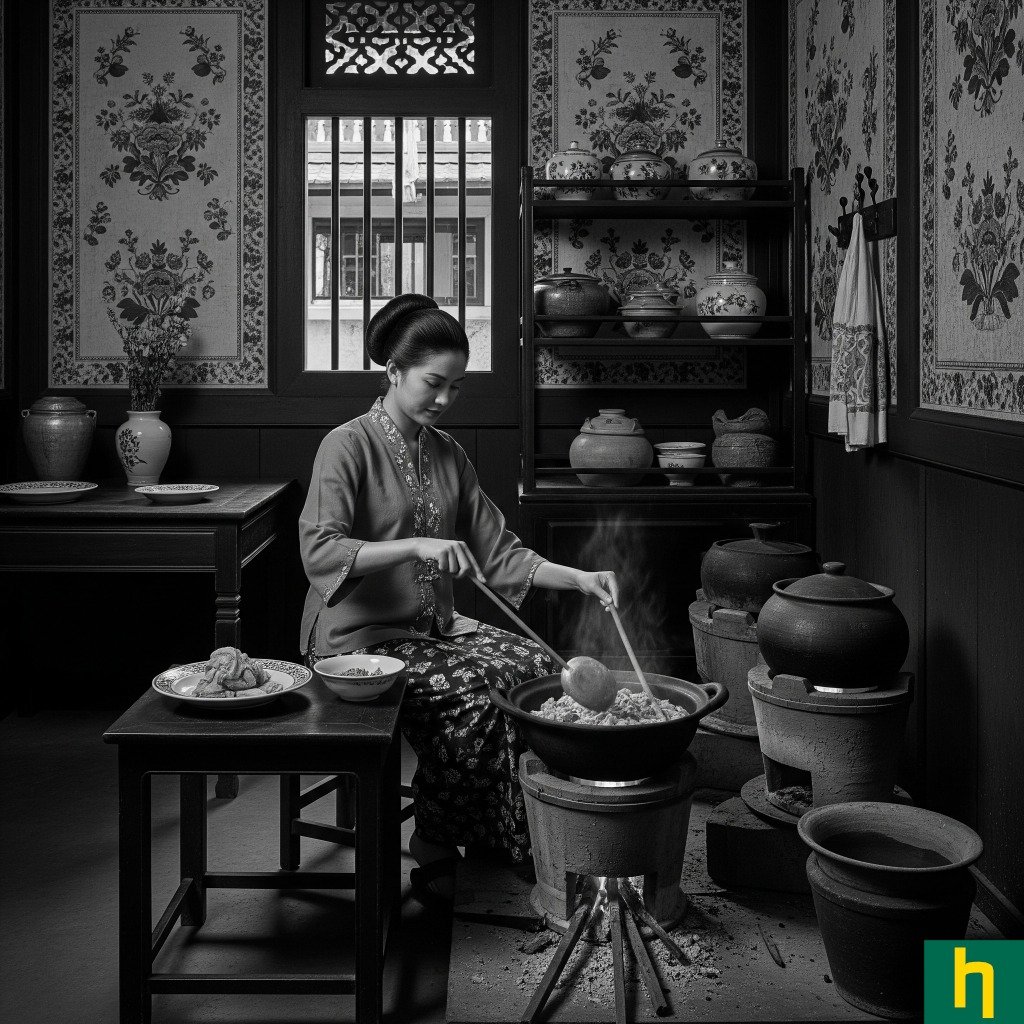Jawi Peranakan is hardly a name that rolls off the tongue, but in Penang, while Nyonya cuisine often takes centre stage, another equally tasty culinary heritage awaits discovery: that of the Jawi Peranakans.
This relatively unknown culinary alchemy blends the aromatic depth of the Middle East and Indian subcontinent with fresh, fragrant notes of the Malay Archipelago. And so for the Foodie Traveller, it tells a compelling story through its curries and fragrant rice dishes, all influenced by historic trade routes that will awaken your taste buds.
I invite you to explore why Jawi Peranakan cuisine has become one of my favourite foods. You’ll find this delicious heritage thriving in the charming, history-rich back streets of George Town, Penang.
Who are the Jawi Peranakans?
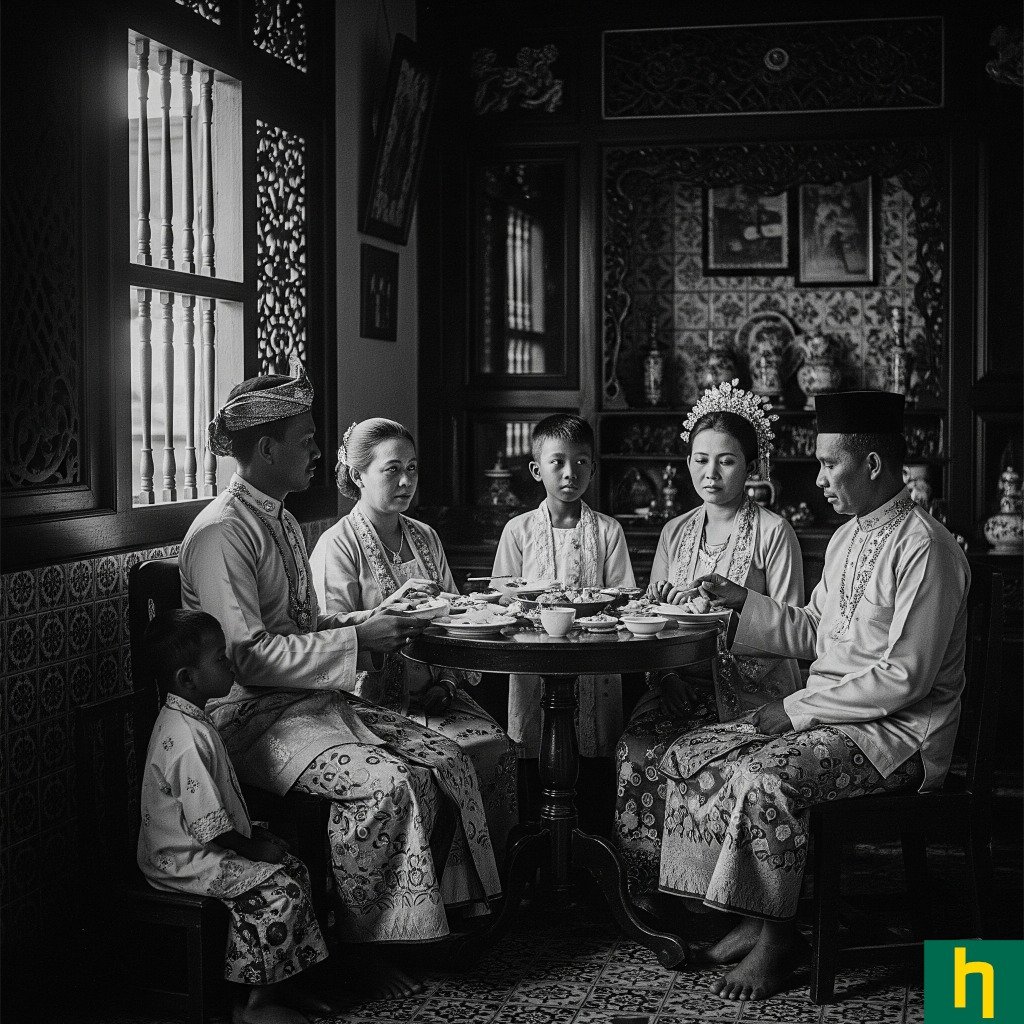
To understand Jawi Peranakan cuisine, you must understand the lineage of its creators.
“Jawi” refers to Southeast Asia (derived from an Arabic word), while “Peranakan” is the Malay term for “locally born” or “born of.” Unlike the Baba Nyonya, whose origins lie in the intermarriage of Chinese traders and local Malay women, the Jawi Peranakans trace their roots to Indian Muslim and Arab merchants who also made Malaysia their home.
Their cultural identity is a magnificent mix. Islam is a cornerstone of their heritage. Their language, referred to as “Bahasa Tanjong” or Penang Malay, is a fusion of loanwords from Tamil and other Indian dialects.
Historically, the Jawi Peranakans weren’t just merchants; they were an elite group, highly literate and English-educated. Many held prominent positions in colonial administration and contributed significantly to Penang’s economy. While their numbers may have dwindled over generations, with many now identifying simply as Malay, their heritage, particularly in the culinary realm, remains.
What Makes Jawi Peranakan Food Special?
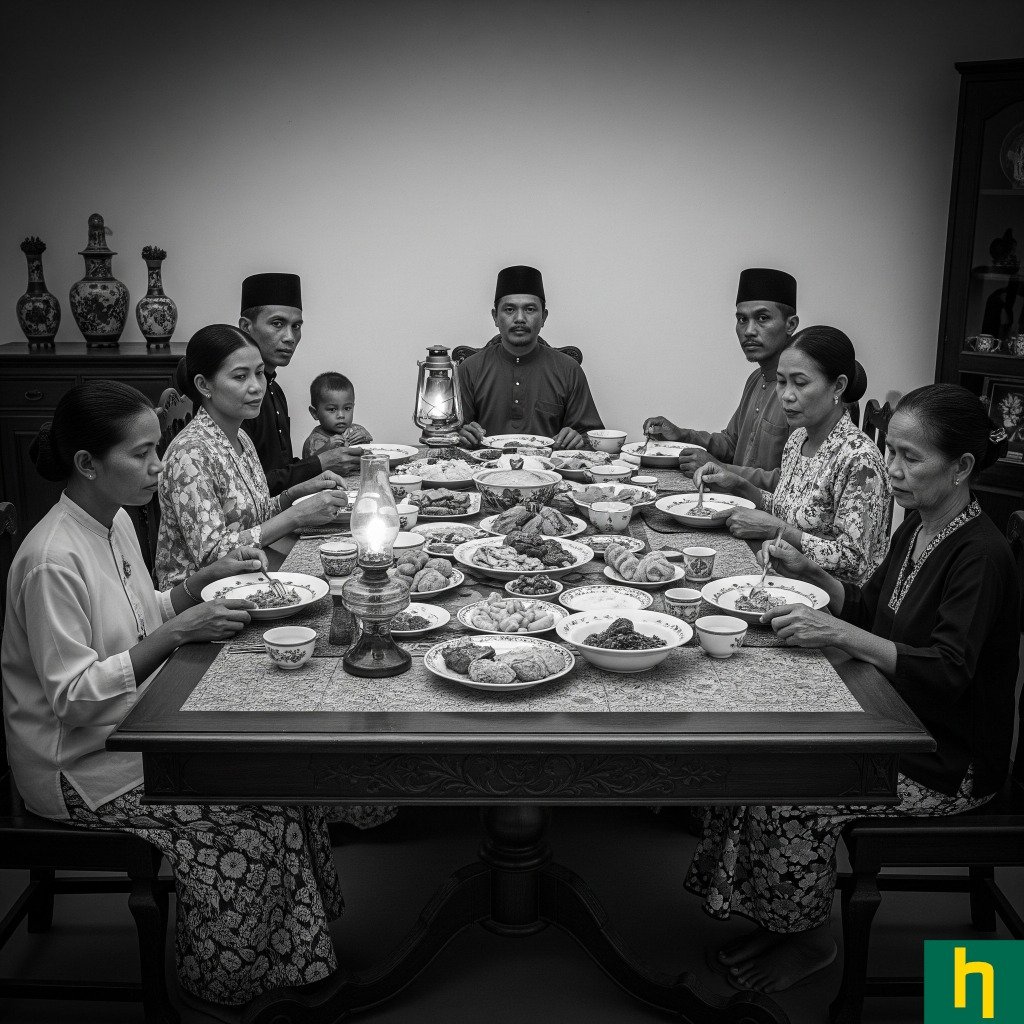
Unlike the brighter, sweeter tastes found in other Malaysian cuisines, Jawi Peranakan dishes offer a more savoury experience. Its uniqueness lies in its layering of influences:
Indian Muslim/Mughal Depth
This is the bedrock. Spices, roasted and freshly ground, are king here: think the warmth of cardamom, cloves, star anise, and cinnamon, the earthy depth of turmeric, cumin, and coriander, and the heat of dried chillies. Unlike the more common Indian Muslim fare you might find, Jawi Peranakan cooking employs more refined techniques – ones used in the kitchens of Mughal India.
Malay Aromatics and Coconut Embrace
While spices from afar define this food, local Malay ingredients provide a counterpoint. The kick of lemongrass, the warmth of ginger flower (bunga kantan), and the citrusy kaffir lime leaf are indispensable. Coconut milk finds its way into many Jawi Peranakan curries, giving it a creamy richness, but balanced by spices, preventing them from becoming overly sweet.
Subtle Arab Echoes
Though less overt than the Indian Muslim or Malay influences, Arab cuisine also leaves its mark. Occasionally, you might detect Middle Eastern spices, and in some traditional rice dishes, there’s the use of dates or dried fruits.
Aromatic and Complex
This is not fast food. Jawi Peranakan dishes demand time, patience, and a precise hand with spices. The result is a depth of flavour, where each spice contributes to the whole. For example, slow-braised lamb, infused with 15 different spices, that perfumes a kitchen for hours.
Savoury With a Tang
Jawi Peranakan dishes are rarely too sweet. They’re a balance of the gentle addition of tamarind (asam jawa) or assam gelugor (dried tamarind slices).
Tumisan
Almost every Jawi Peranakan dish begins with the sautéing of thinly sliced onions until deeply caramelised. This process extracts depth, forming the essential base before spice pastes (rempah) are added. It’s this approach that sets the stage for the flavours to unfold.
Rempah
While coconut milk-based curries are common in Malay cuisine, Jawi Peranakan versions are identifiable by their rempah. Their spice pastes feature a different blend of dry spices, which differentiates them from their Malay or even Nyonya counterparts.
Jawi Peranakan vs Baba Nyonya Food
While both cuisines represent extraordinary fusions born of intermarriage, their influences, and thus their flavour profiles, tell entirely different stories within Penang’s culinary history.
Primary Influences
Jawi Peranakan food points firmly towards the Indian Muslim and Arab world. The emphasis on Islamic dietary laws, particularly the absence of pork and alcohol, fundamentally shapes the ingredient list.
Baba Nyonya fare is predominantly Chinese, specifically Hokkien, blended with strong Malay influences. This creates a culinary identity defined by Chinese wok-frying techniques alongside Malay spice pastes and ingredients.
Spice Palate
Jawi Peranakan food is characterised by its earthy, aromatic, and deeply savoury profile. The reliance on cardamom, cloves, cinnamon, cumin, and star anise gives dishes a complex, perfumed depth. The heat is typically a slow burn, built from dried chillies, not necessarily a fiery explosion.
Baba Nyonya food is brighter, with fresh herbs, and balances the sweet, the sour, and the spicy. Key ingredients include belacan (fermented shrimp paste) and a prominent use of fresh chillies, lemongrass, and bunga kantan. Their sourness often comes from dried tamarind slices or tamarind pulp, giving a distinct tang.
Key Ingredients
Jawi Peranakan food uses plenty of ghee and Indian-derived ingredients like pulses or vegetables, not common in Nyonya cooking. Lamb and beef feature heavily, cooked to perfection.
Baba Nyonya food, on the other hand, uses fermented soybean paste, salted vegetables, and prominently, pork in many traditional dishes (e.g., babi pongteh).
Illustrative Dishes: A Taste Test of Divergence
Penang “Laksa” is a perfect illustration of these cuisines’ separate journeys. A Baba Nyonya Laksa is a sour, fish-based broth, with a clear, thin texture, lots of herbs and a potent hit of sweet prawn paste. The Jawi Peranakan equivalent, Laksa Jawi, is a world apart: richer, thicker, and creamier, using a complex spice mix giving it a more aromatic character.
Similarly, while both cuisines feature curries, the execution is different. A Jawi Peranakan Kari Kepala Ikan (Fish Head Curry) has a deeper spice profile with hints of Indian influence, while a Nyonya curry is blessed with tamarind and the fragrant rempah based on fresh herbs and belacan. Even the beloved Rendang, while ubiquitous, reveals nuances: the Jawi Peranakan version embraces a darker, more caramelised depth from longer, gentler cooking with a broader spectrum of dry spices.
Where to Find Jawi Peranakan Food: A Culinary Treasure Hunt in Penang
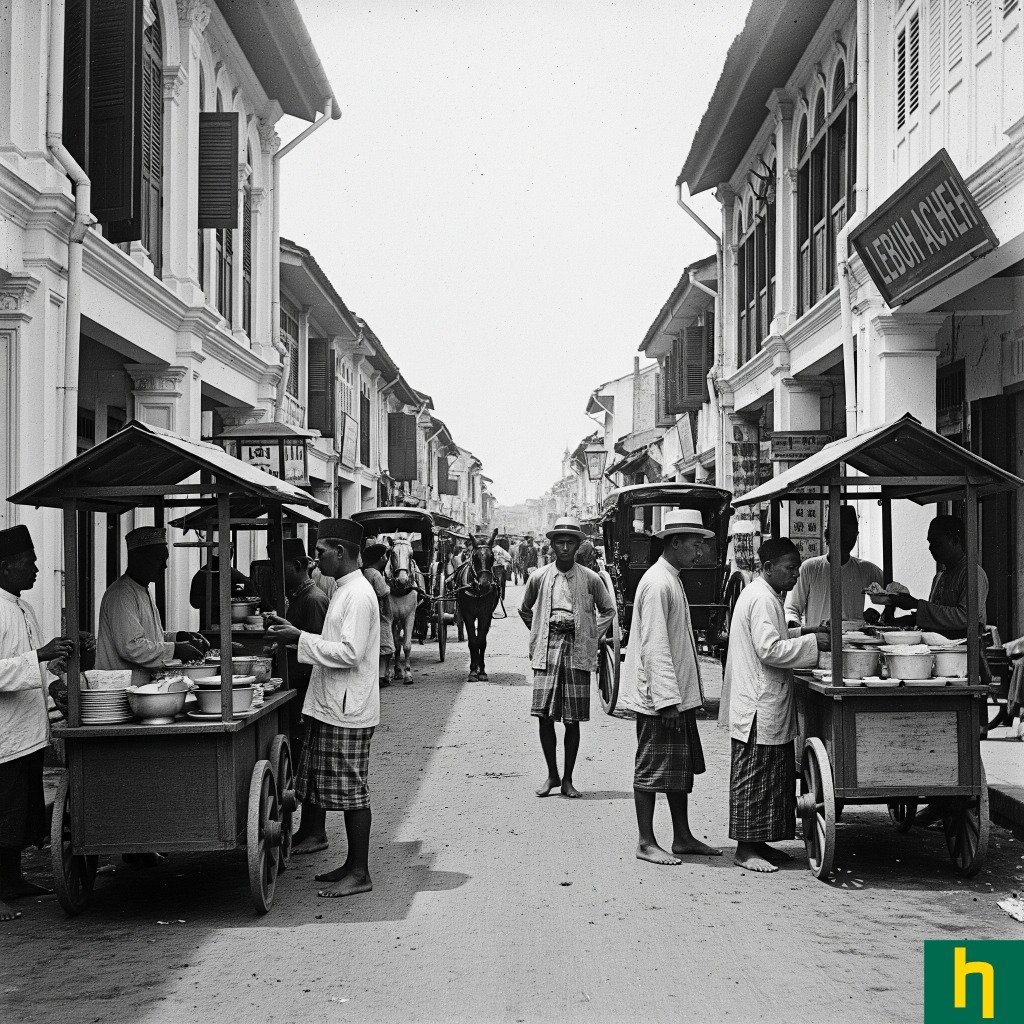
The quest for authentic Jawi Peranakan cuisine is akin to a treasure hunt. Unlike the readily available Nyonya restaurants, Jawi Peranakan food requires a more discerning eye.
Your journey should begin on Lebuh Acheh (Acheh Street) and Lebuh Queen (Queen Street). These historic areas were once the bustling heart of Penang’s Indian Muslim community. Tucked away amidst the mosques and traditional shophouses, you’ll find family-run establishments, bursting with the flavours of generations past.
Look for signs that hint at authenticity: a handwritten menu in Malay, the presence of elderly patrons who are regulars, and the absence of flashy tourist trappings. Some establishments might not even have formal names, identified only by their address or the family name above the door. These are the places where the true essence of Jawi Peranakan cuisine resides.
Jawi House: Penang’s Jawi Peranakan Heritage
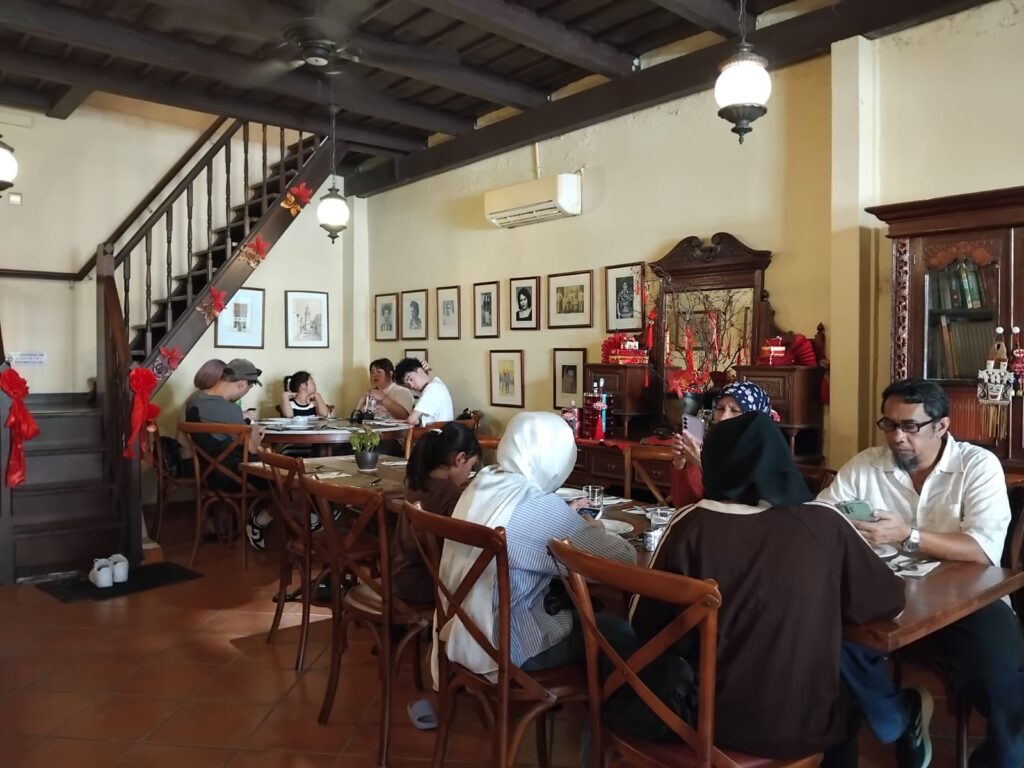
However, if wandering endless backstreets under the burning sun isn’t your thing, then there is one delightful restaurant you cannot miss.
Jawi House on Armenian Street isn’t just a restaurant; it’s a “cafe gallery” cultural preservation with an exquisite culinary experience. Located in the heart of George Town’s UNESCO World Heritage Site, it’s perfectly situated for those exploring the area’s charm.
The ambience at Jawi House is captivating. Housed in a beautifully restored heritage building, the interior has a warm, inviting charm with traditional Malay architecture, heritage tiles, and antique furnishings. They even have an art gallery section upstairs showcasing local art and crafts, adding another layer to the cultural immersion.
Jawi House specialises in Jawi Peranakan cuisine. Everything here is halal, making it a welcoming spot for Muslim diners.
Opt for the Nasi Lemuni with Beef Rendang. The Nasi Lemuni is cooked with lemuni leaves and butterfly pea flowers, offering a delicate aroma and a beautiful blue hue, served with crispy anchovies and a perfectly spiced sambal.
The Beef Rendang is tender, succulent, slow-cooked beef in an aromatic gravy that has just the right amount of depth and spice. Traditional recipes and high-quality ingredients are at the forefront here in this most amazing restaurant.
Try the Lamb Biryani. The basmati rice is fragrant and fluffy, infused with spices, and topped with plump raisins and cashews. The lamb itself is guaranteed to be melt-in-your-mouth tender.
Beyond the food, the service at Jawi House is attentive and genuinely pleasant. The staff are knowledgeable about the dishes and happy to chat to you about Jawi Peranakan cuisine. There’s a real passion for sharing this culinary heritage in the Jawi Peranakan community.
Dishes are reasonably priced, with main courses generally ranging from RM20 to RM40, offering excellent value for the quality and authenticity you receive.
For anyone seeking an authentic, flavourful, and culturally enriching dining experience in George Town, Jawi House happens to be my favourite restaurant in Penang. It’s a true gem that you are going to enjoy.
The Allure of Jawi Peranakan Cuisine
What makes Jawi Peranakan food so compelling? Perhaps it’s the familiar comfort of Indian spices, often embraced by those with a British background (like myself). Or maybe it’s the intriguing allure of Malay flavours that continues to fascinate me. It could even be a delightful contrast to my own Straits Chinese culinary heritage. Regardless of the reason, no other cuisine so vividly reminds me of Penang’s incredible cultural mix as Jawi Peranakan food.
For any food-loving traveller, Jawi Peranakan cuisine offers a unique pathway to a better understanding of the true Malaysia. It beckons the curious palate, inviting you to discover a heritage as rich and captivating as its flavours. This culinary tradition deserves to be celebrated, ensuring its unique story continues to resonate for generations to come.
Jawi Peranakan Cuisine FAQs
What is Jawi Peranakan cuisine, and where does it originate?
Jawi Peranakan cuisine is a distinct culinary tradition from Penang, Malaysia, that fuses the rich flavours of the Middle East and Indian subcontinent with local Malay ingredients. It originates from the Jawi Peranakans, a community of descendants of Indian Muslim and Arab merchants who settled in the Malay Archipelago and intermarried with local Malay women.
How does Jawi Peranakan food differ from other Malaysian cuisines?
Unlike other well-known Malaysian foods, Jawi Peranakan cuisine is characterised by its complex and savoury profile. While it uses some of the same local ingredients as other Malaysian food, its flavour base relies heavily on spices from the Indian Muslim tradition, such as cardamom and cumin, rather than the liberal use of chilli and belacan (shrimp paste) found in cuisines like Nyonya food.
What are some of the key ingredients and cooking techniques used?
Jawi Peranakan cuisine features aromatic spices like cardamom, cloves, and cumin. Cooks also use local herbs like lemongrass and ginger to enhance the flavour. Chefs often add coconut milk to provide a signature richness to their dishes. One signature technique involves slowly sautéing onions until they deeply caramelise. This process forms a sweet, flavorful base for various curries and rice dishes.
What are some popular dishes associated with Jawi Peranakan cuisine?
Nasi Kenduri, a festive biryani-style rice dish, represents a prominent example of Jawi Peranakan food. This ghee rice combines aromatic spices with crunchy nuts and sweet dried fruits. Another key dish, Pajeri Nenas, features a savoury curry made with pineapple chunks. Cooks simmer the fruit and spices in rich coconut milk to create this unique flavour. Families often serve these dishes during special feasts and joyful celebrations.
How is Jawi Peranakan cuisine a reflection of the community’s heritage?
The cuisine is a direct reflection of the Jawi Peranakan heritage as it symbolises the fusion of cultures from its immigrant forefathers and local Malay mothers. The intricate blend of spices from the Indian subcontinent and Arabia, with fresh, tropical ingredients from the Malay Peninsula, creates a unique and subtle culinary heritage that distinguishes the community from other groups in the region.

